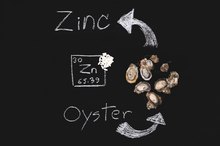What does fact checked mean?
At Healthfully, we strive to deliver objective content that is accurate and up-to-date. Our team periodically reviews articles in order to ensure content quality. The sources cited below consist of evidence from peer-reviewed journals, prominent medical organizations, academic associations, and government data.
- MayoClinic.com: Zinc
- Case Studies: Zinc Abuse - An Unsuspected Cause of Sideroblastic Anemia
- Case Studies: Zinc Abuse - An Unsuspected Cause of Sideroblastic Anemia
- Journal Of The National Medical Association: Internal Medicine
- Journal Of The National Medical Association: Internal Medicine
The information contained on this site is for informational purposes only, and should not be used as a substitute for the advice of a professional health care provider. Please check with the appropriate physician regarding health questions and concerns. Although we strive to deliver accurate and up-to-date information, no guarantee to that effect is made.
Zinc & Urine Color
Zinc is an essential mineral that plays a variety of important functions in the body. While generally healthy when taken in doses of 300 milligrams or less a day, excess zinc consumption can lead to poisoning that may cause a variety of symptoms, including orange-colored urine. For best results, monitor your urine regularly to make sure it remains a light yellow, indicating proper hydration.
Zinc
Zinc plays an essential role in more than 300 separate reactions in the body, including: carbohydrate metabolism, insulin regulation and the maturation of sperm cells, notes MayoClinic.com. While most balanced diets contain the required amount of zinc, some alternative health practitioners recommend zinc supplements and lozenges as a preventive treatment for the common cold. Zinc generally does not affect urine color when taken in doses of 300 milligrams or less per day.
Urine Color
Blood in Urine & B-12 Deficiency
Learn More
Urine color is a common indicator for proper hydration, sickness or toxicity. While many cases of discolored urine occur because of medications and food dyes, some urine colors are commonly associated with different health conditions. For example: red or pink urine is sometimes caused by bladder stones, urinary tract infections, enlarged prostate, kidney cysts or hematuria, or urinary blood.
Medications such as Rifampin and phenazopyridine, or foods such as beets, blackberries and rhubarb may also discolor urine.
According to PetWellbeing.com, zinc toxicity in animals may cause symptoms of red or brownish-orange urine. Unfortunately, results in humans are typically inconsistent, and most cases of urine discoloration arise from taking certain medications.
- Urine color is a common indicator for proper hydration, sickness or toxicity.
- Unfortunately, results in humans are typically inconsistent, and most cases of urine discoloration arise from taking certain medications.
The Connection
Microscopic urine tests are typically performed to isolate the causes of certain symptoms. According to the “Journal of the National Medical Association,” pus in the urine shows chronic degeneration in the urinary tract, while blood may be indicative of hemorrhage and inorganic salts point to stone formation in the kidneys or bladder 2. While some of these conditions may occur in individuals with heavy metal poisoning, such as zinc toxicity, there is no recorded level of urine discoloration as a result of moderate zinc intake. For example: an accident report published in the “Case Reports” journal followed the symptoms of a 34-year old man who ingested high quantities of zinc in volumes of one to two grams a day for many months. Although the patient developed a number of unpleasant conditions, such as sideroblastic anemia and fatigue, he did not exhibit symptoms of discolored urine.
- Microscopic urine tests are typically performed to isolate the causes of certain symptoms.
- While some of these conditions may occur in individuals with heavy metal poisoning, such as zinc toxicity, there is no recorded level of urine discoloration as a result of moderate zinc intake.
Safety Concern
What Does Positive Leukocytes Mean?
Learn More
When in doubt, only take zinc supplements under the supervision of your doctor or health care provider. Like iron, zinc is required in moderate amounts to provide ample nutrition in the diet. However, taking too much can lead to heavy metal poisoning, which may manifest in a variety of negative symptoms. Never exceed the recommended dosage printed on your product’s label.
- When in doubt, only take zinc supplements under the supervision of your doctor or health care provider.
Related Articles
References
- Case Studies: Zinc Abuse - An Unsuspected Cause of Sideroblastic Anemia
- Journal Of The National Medical Association: Internal Medicine
- Perrier ET, Johnson EC, McKenzie AL, Ellis LA, Armstrong LE. Urine colour change as an indicator of change in daily water intake: a quantitative analysis. Eur J Nutr. 2016;55(5):1943–1949. doi:10.1007/s00394-015-1010-2
- Cortes-Penfield NW, Trautner BW, Jump RLP. Urinary Tract Infection and Asymptomatic Bacteriuria in Older Adults. Infect Dis Clin North Am. 2017;31(4):673–688. doi:10.1016/j.idc.2017.07.002
- Dreger NM, Degener S, Ahmad-Nejad P, Wöbker G, Roth S. Urosepsis--Etiology, Diagnosis, and Treatment. Dtsch Arztebl Int. 2015;112(49):837–848. doi:10.3238/arztebl.2015.0837
- Jump RL, Crnich CJ, Nace DA. Cloudy, Foul-Smelling Urine Not a Criteria for Diagnosis of Urinary Tract Infection in Older Adults. J Am Med Dir Assoc. 2016;17(8):754. doi:10.1016/j.jamda.2016.04.009
- Kang KK, Choi JR, Song JY, et al. Clinical significance of subjective foamy urine. Chonnam Med J. 2012;48(3):164–168. doi:10.4068/cmj.2012.48.3.164
- Blackburn PR, Gass JM, Vairo FPE, et al. Maple syrup urine disease: mechanisms and management. Appl Clin Genet. 2017;10:57–66. Published 2017 Sep 6. doi:10.2147/TACG.S125962
- Prakash S, Saini S, Mullick P, Pawar M. Green urine: A cause for concern?. J Anaesthesiol Clin Pharmacol. 2017;33(1):128–130. doi:10.4103/0970-9185.202190
- Torres PA, Helmstetter JA, Kaye AM, Kaye AD. Rhabdomyolysis: pathogenesis, diagnosis, and treatment. Ochsner J. 2015;15(1):58–69. PMID: 25829882
- Rehfuss A, Mahon J, Sorokin I, Smith C, Stein BS. Phenazopyridine: A Preoperative Way to Identify Ureteral Orifices. Urology. 2018;115:36-38. doi:10.1016/j.urology.2018.02.023
- American Urological Association. Diagnosis, Evaluation and Follow-up of Asymptomatic Microhematuria (AMH) in Adults. 2016.
- Worku DA. Purple urine bag syndrome: An unusual but important manifestation of urinary tract infection. Case report and literature review. SAGE Open Med Case Rep. 2019;7:2050313X18823105. Published 2019 Jan 12. doi:10.1177/2050313X18823105
- Alkaptonuria. National Institutes of Health. Genetic and Rare Diseases Information Center. 3/18/2016
- Seo JW, Lee JH, Son IS, et al. Acute oxalate nephropathy caused by ethylene glycol poisoning. Kidney Res Clin Pract. 2012;31(4):249–252. doi:10.1016/j.krcp.2012.09.007
- Urinalysis. Visual Examination. Lab Tests Online. https://labtestsonline.org/understanding/analytes/urinalysis/ui-exams
Writer Bio
Based in the Appalachian Mountains, Brian Connolly is a certified nutritionist and has been writing professionally since 2000. He is a licensed yoga and martial arts instructor whose work regularly appears in “Metabolism,” “Verve” and publications throughout the East Coast. Connolly holds advanced degrees from the University of North Carolina, Asheville and the University of Virginia.








